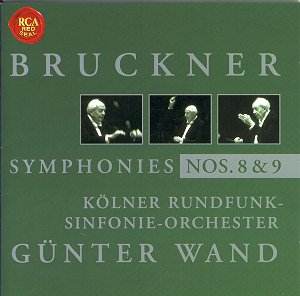When Günter Wand made this, his first recording of Bruckner’s
Ninth Symphony, he was 66: old enough, you might think, to offer an experienced
and fully formed interpretation of Bruckner’s bare and often painful last
work. Yet his final performance of it came some 23 years later, in a Prom
at the Royal Albert Hall which wrote its hero’s mantra of ‘So und nicht
anders’ indelibly on the eyes and ears of all those fortunate to be present.
It’s all the more revealing, then, to go back and find
out that ‘Thus and no other way’ is true only, shall we say, for the
moment at which any of Wand’s interpretations were being created. For
RCA offer us ample opportunity to find out that Wand’s views and feeling
for the works’ many corners changed if not radically then appreciably
over the course of the two decades following these recordings.
The semitone stepwise motifs on clarinet and oboe which
open the Eighth and on which its eighty minutes are built would be more
plaintively drawn out later on. The cellos’ first presentation of the
main theme would later gain tension for being slightly held back. Even
the second theme has a rigidity which many used to think of as characteristic
of Wand’s conducting (encouraged by his constant emphasis on the need
for one basic tempo within a movement) and yet which is belied by any
examination of his evolution as a performer, in Bruckner above all others.
Cologne Radio’s brass section is no match for that of the NDR orchestra
or the Berlin Philharmonic, and yet Wand appears to encourage it to
dominate at tutti climaxes, obliterating the fascinating and unpredictable
figurations in the wind and strings which he would later so carefully
cultivate. The walls of sound which they create then obstruct the momentum
which is so intrinsic to the Eighth by virtue of those appoggiatura-like
stepwise motifs. Elsewhere the Cologne orchestra is biddable but hardly
timbrally distinctive; oboe and flute present their questing dialogue
at 10" entirely without accents, as though they didn’t know which
note was coming next; hardly possible, but it creates an oddly naïve
effect. The horn solo 5" into the Adagio is far too prosaically
done for it to convey any pregnancy of gesture. The muzziness of the
woodwind section's tuning and ensemble at 13" in the Scherzo (shortly
after a nasty edit which I suspect the remastering has exaggerated)
are sadly typical of the general standard of playing on these discs.
Admirable as the philosophy is that the music, if straightforwardly
presented, should be able to speak for itself, the result in this case
is an occasional disengagement which inevitably transfers itself to
the listener. All that said, Richard Osborne has declared this Eighth
'exceptionally fine', 'the consummation of the Wand style'. Moments
like the first tutti of the Scherzo, where we can hear every note of
the scales in contrary motion, are undeniably characteristic
The Ninth is less of a blueprint for his later thoughts
and better played. Some may find its haunting bareness more affecting
at the less inflected tempos of this first recording, and there is no
sign of the slight but debilitating accelerando during the passage to
the Adagio's crisis that would mar some of Wand's later recordings.
But an Adagio of Bruckner 9 which eschews introversion in favour of
a resplendent presentation of its angst-ridden dissonances is not for
me.
Even if these recordings weren’t superseded in subtlety
by Wand’s later performances, faithfully transcribed to disc by RCA,
the sound would put them out of court. The entry of timpani at climaxes
often causes the engineers to lower the levels, flattening out Bruckner’s
terraced dynamics rather as Radio 3 often does for its FM broadcasts
these days. Coupled with the obvious spotlighting of wind solos, this
dynamic compression is fatal to the music’s potential for tension. Some
will find justifiably irritating the mike attached to the harp in the
Eighth which presents it so prominently in the left channel.
As I don’t have access to the original LPs, I can’t
tell which of these sonic inadequacies are to be laid at the feet of
Cologne’s radio engineers and which are the fault of BMG’s remastering
team, but having heard other Cologne recordings, I suspect the latter
is more to blame. Michael Kennedy noted of the LPs that they 'were made
in a slightly resonant acoustic which adds its own spaciousness to that
of the interpretations and in these crowning masterpieces the total
effect, captured faithfully by the engineers, is devastating.' There
you have it. If you have the original LPs, perhaps it's time to dust
them down. If not, I direct you towards his later remakes of both works
with the NDR, live in Lübeck Cathedral. These really do distil
Bruckner's ever more troubled late compositional language with an extended
lifetime of wisdom.
Peter Quantrill


